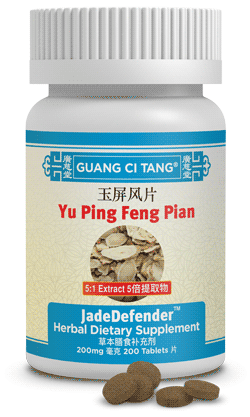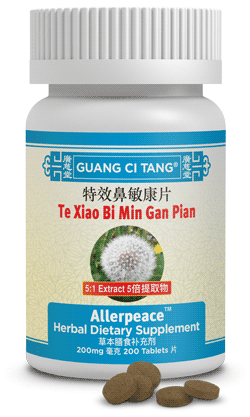What Causes Allergies? A TCM Perspective On Seasonal Allergy Management

Winter is mercifully over. The talk of the town is no longer snowstorms and the severe cold and flu season. The landscape will soon transform into a magical bouquet of flower blooms, buzzing bees and, unfortunately for millions of people, another seasonal nuisance: allergies. In this post, we’ll examine the root causes of seasonal allergies, as well as tips for prevention and treatment in TCM.
What Causes Allergies? A Western Perspective
In conventional medicine, the release of pollen into the air by trees, grasses and weeds is by far the most common catalyst of allergies during Springtime.
Pollen is mistaken as a pathogen by the immune system, which rallies to the defense, mobilizing IgE antibodies to attack pollen, thus triggering the release of inflammatory chemicals such as histamine. Histamine opens the blood vessels and causes swollen membranes. The result is the familiar symptoms of runny nose, as well as itchy and watery eyes.
In western medicine, doctors prescribe prescription medications to treat seasonal allergies. Or, allergy sufferers self-medicate with over-the-counter antihistamines.
What Causes Allergies? A TCM Perspective
In comparison, traditional Chinese medicine (TCM), offers different theories for spring allergies.
According to TCM theory, one explanation for seasonal allergies is the state of your health in the preceding season. Take the transition from winter to spring as an example. In the winter, stress can weaken immunity. Examples include working too hard; not resting or sleeping enough; going to bed too late; exercising too strenuously without resting and refueling the body; and getting wiped out by a nasty cold or flu. And don’t forget about running around during the holidays buying gifts for friends and family. All these factors can produce Qi deficiency, which in turn weakens the immune system.
Symptoms of allergies manifest due to the weakest link in your Zang fu organ system. And more often than not, the weakest link is the Lung organ system. In fact, allergic skin diseases, rhinitis, and asthma are all related to the Lungs, according to TCM theory.
Specifically, Lung Qi deficiency causes these conditions. It makes sense that a runny nose is one of the most common symptoms of seasonal allergies. After all, the Lung meridian opens into the nose.
Supporting Your Immune System Using TCM
To lower your chance of having weakened Qi by the time Spring rolls around, take it extra easy in winter. There’s also one of our classic TCM formulas that may help support your immune system: JadeDefender.
Unfortunately, most people wait before it’s too late. And if that’s the case for you, and you’ve already experienced miserable allergy symptoms, your Lung Qi and Yin energy have been damaged. Thus, you need to nourish Lung Qi and Yin energy directly. Indirectly, it also helps to nourish the Spleen and Kidney organ systems.
TCM Herbs for Nourishing Lung Qi and Yin Energy
Astragalus and and atractylodes are TCM herbs beneficial for Lung Qi. Both Coastal Glehnia Root and lily bulb benefit Lung Yin. Also, to help support your immune system, both Siler Root and Reishi mushroom may help. Reishi is among the rarest and most precious herbs in TCM.
And if you’re seeking clear and healthy nasal passages, AllerPeace may help. This signature formula contains 11 botanical ingredients that are non-drowsy and non-habit forming.







